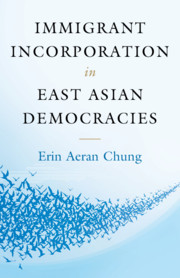Crossref Citations
This Book has been
cited by the following publications. This list is generated based on data provided by Crossref.
2021.
BIBLIOGRAPHY.
International Review of Social History,
Vol. 66,
Issue. 2,
p.
329.
Kim, Kyunghwan
2021.
Framing Immigrant Rights in Politics: Comparative Evidence From Japan and South Korea*.
Pacific Focus,
Vol. 36,
Issue. 2,
p.
287.
Arrington, Celeste L.
and
Goedde, Patricia
2021.
Rights Claiming in South Korea.
Low, Choo Chin
2021.
The historical development of the nature of ‘desirability’ in naturalisation regimes in East and Southeast Asia.
Citizenship Studies,
Vol. 25,
Issue. 4,
p.
491.
Malit, Froilan T
and
Tsourapas, Gerasimos
2021.
Weapons of the Weak? South–South Migration and Power Politics in the Philippines–GCC Corridor.
Global Studies Quarterly,
Vol. 1,
Issue. 3,
Chung, Erin Aeran
2022.
The side doors of immigration: multi-tier migration regimes in Japan and South Korea.
Third World Quarterly,
Vol. 43,
Issue. 7,
p.
1570.
Estévez-Abe, Margarita
and
Caponio, Tiziana
2022.
Badante or Bride? Patterns of Female Migration in Italy, Japan, Korea, and Spain.
International Migration Review,
Vol. 56,
Issue. 4,
p.
1167.
Fargues, Emilien
Solano, Giacomo
Huddleston, Thomas
Vink, Maarten
Schmid, Samuel
Baubock, Rainer
Pedroza, Luicy
Palop-García, Pau
Dzankic, Jelena
and
Mantha-Hollands, Ashley
2022.
Going Global: Opportunities and Challenges for the Development of a Comparative Research Agenda on Citizenship Policies at the Global Level.
SSRN Electronic Journal ,
Lori, Noora
2022.
Possible Citizens: Migration Enforcement as the Performance of Citizenship in the United Arab Emirates.
International Migration Review,
Vol. 56,
Issue. 3,
p.
727.
Hough, Jennifer
2022.
The contradictory effects of South Korean resettlement policy on North Koreans in South Korea.
Journal of Ethnic and Migration Studies,
Vol. 48,
Issue. 20,
p.
4922.
Laurence, James
Igarashi, Akira
and
Ishida, Kenji
2022.
The Dynamics of Immigration and Anti-Immigrant Sentiment in Japan: How and Why Changes in Immigrant Share Affect Attitudes toward Immigration in a Newly Diversifying Society.
Social Forces,
Vol. 101,
Issue. 1,
p.
369.
Cheuk, Ka-Kin
2022.
Diasporic convergence, sustained transience and indifferent survival: Indian traders in China.
History and Anthropology,
Vol. 33,
Issue. 2,
p.
279.
Lan, Pei‐Chia
2023.
Geopolitical multiculturalism in East Asia.
Asia Pacific Viewpoint,
Vol. 64,
Issue. 3,
p.
425.
Denney, Steven
Ward, Peter
and
Green, Christopher
2023.
Public Support for Migrant Entrepreneurship: The Case of North Koreans in the Republic of Korea.
International Migration Review,
Haddad, Mary Alice
2023.
Environmental Politics in East Asia.
Sharpe, Michael Orlando
2023.
Japan Decides 2021.
p.
305.
Jones, Chelle
2023.
Jigsaw Migration: How Mixed Citizenship LGBTQ Families (Re)Assemble Their Fragmented Citizenship.
International Migration Review,
Kato, Gento
and
Lu, Fan
2023.
The Relationship Between University Education and Pro-Immigrant Attitudes Varies by Generation: Insights From Japan.
International Journal of Public Opinion Research,
Vol. 35,
Issue. 4,
Tian, Yunchen
2023.
Sustainability, Diversity, and Equality: Key Challenges for Japan.
Vol. 13,
Issue. ,
p.
109.
Lan, Pei-Chia
2024.
Contesting Boundaries and Navigating Identities: Second-Generation Adult Children from Cross-Border Marriages in Taiwan.
International Migration Review,



